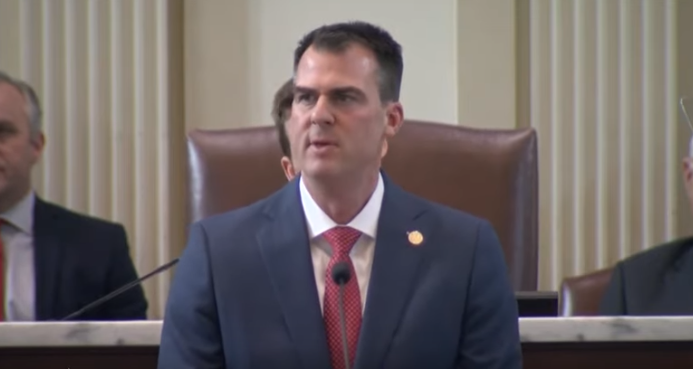On Monday February 3rd, Governor Stitt kicked off the 2020 legislative session with his yearly State of the State Address. This speech sets the tone for the year with a review of last session and an outline of the governor’s policy goals for 2020. Here are the highlights and CAIR-OK’s take on them:
Consolidation. Governor Stitt said that Oklahoma’s greatest challenge is government bureaucracy. Stitt stated, “any policy that the Legislature sends to my desk to further this effort will be signed.” Stitt then spotlighted healthcare services, revealing he wants to create one single overarching health department and dissolve/consolidate many of the other agencies.
Savings. Oklahoma currently has 1 billion dollars in savings and according to Stitt, because of these heightened reserves, Moody’s Investor Service changed Oklahoma’s rating from “stable” to “positive” in October. Stitt further went on to call the legislature to increase the Rainy Day Fund cap to 30% and to put aside another 100 million dollars into savings.
SoonerCare 2.0. Stitt revealed a broad, if not detailed plan to “close the gaps of those uninsured in Oklahoma,” which he is calling SoonerCare 2.0. Recently, the Administrator for the Centers for Medicare & Medicaid Services, (CMS), Seema Verma, invited states to apply for “Healthy Adult Opportunities,” a block grant-like option for the Medicaid expansion population where states get a chunk of money indexed below need. In this plan, there is less consumer oversight or federal protection, and greater authority to limit access to coverage. It would also allow states to limit which drugs they cover (known as a “closed formulary”), and includes some new flexibility for Federally Qualified Health Centers (FQHC). Many are concerned that if this reaches the implementation phase; meaning, if the legislative pieces pass and if CMS signs off on the waiver, there will be litigation. Opponents state that CMS’s guidance seeks to waive a part of statute that can’t be waived. In addition, the Governor is calling for work reporting requirements, which continue to be shut down in court.
Education Budget. The Governor broached the subject of education by mentioning the last two years of incremental teacher pay raises, but he did not indicate his support for further school funding or for teacher compensation in order to raise Oklahoma teacher pay to competitive levels. Oklahoma Education Association (OEA) President, Alicia Priest, stated “there was no call for more money for the classroom, no call for a cost-of-living adjustment for our retirees and no call for teacher or support professional pay raises.” She further stated, “our per pupil expenditure is still near the bottom nationally… Our teachers didn’t walk in 2018 for a one-time payout. We walked so our children would have a brighter future.”
Stitt’s address this year regarding teachers was focused on allocating new monies to private schools. His budget allots for 17 million dollars for public schools, while 25 million dollars are allocated to The Opportunity Scholarship Fund, which is a scholarship granting organization that provides scholarships to Oklahoma K-12 students to attend private schools. This is essentially a private school voucher. Many education advocates find this budget unacceptable as 90% of children in Oklahoma attend public schools.
Tribal Gaming. As nearly all 39 tribal chiefs sat in the House Chamber balcony, Stitt doubled down on his ongoing battle regarding tribal gaming compacts. Although to date, tribes have not ceased paying regular gaming fees to the state which support about 1% of common education funding, the Governor implored of the legislature, “while we wait for the federal court’s decision, I am calling for the Legislature to join me in protecting public education. I am asking for legislation that will allow the remaining cash balance from 2019 and funds from the Revenue Stabilization Fund to be leveraged, if needed, to compensate for any temporary pause in Class III gaming fees.”
Other issues to be watching:
Anti-BDS Bill Filed. A bill seeking to limit free speech has been filed this year. Click here to read more about this bill. CAIR-OK will be following this bill closely and will keep you updated.
Independent Redistricting. The ballot initiative seeking to end gerrymandering and to make the redrawing of district lines transparent and impartial was struck down by the Oklahoma Supreme Court. However, another initiative has been submitted for approval. Click here to read more. CAIR-OK will continue to follow and be in support of this initiative.

